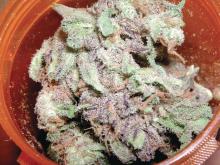By the time Ann Marie Owen turned to marijuana to treat her pain, she was struggling to walk and talk. She also hallucinated.
For 4 years, her doctor prescribed the 61-year-old a wide range of opioids for her transverse myelitis, a debilitating disease that caused pain, muscle weakness, and paralysis.
The drugs not only failed to ease her symptoms, they also hooked her.
When her home state of New York legalized marijuana for the treatment of select medical ailments, Ms. Owens decided it was time to swap pills for pot. But her doctors refused to help.
“Even though medical marijuana is legal, none of my doctors were willing to talk to me about it,” she said. “They just kept telling me to take opioids.”
While 29 states have legalized marijuana to treat pain and other ailments, the growing number of Americans like Ms. Owen who use marijuana and the doctors who treat them are caught in the middle of a conflict in federal and state laws – a predicament that is only worsened by thin scientific data.
Because the federal government classifies marijuana a Schedule 1 drug – by definition a substance with no currently accepted medical use and a high potential for abuse – research on marijuana or its active ingredients is highly restricted and even discouraged in some cases.


